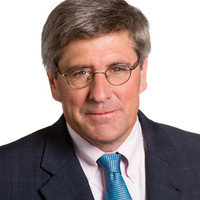Reading and math scores are abysmal across the country, as national testing results keep documenting. Illiteracy rates are rising: The number of 16- to 24-year-olds reading at the lowest literacy levels increased from 16% in 2017 to 25% in 2023, according to data from the National Center for Education Statistics.
In some inner-city schools, less than half of kids are reading or doing math at grade-level proficiency. Many high school grads can't read their diplomas.
As an economist, I would submit that this is our greatest crisis. It puts the future of American prosperity in grave danger. Also, the learning gap widens income and wealth disparities.
The apparent solution among the education establishment is not to challenge kids to stretch their minds and hit the books but rather to dumb down the curriculum so everyone passes. I call this the "make everyone below average" solution.
Some schools are now no longer requiring kids in English class to read cover to cover the classic books that students have been reading for decades. Perhaps the students don't have the attention spans. Perhaps their reading skills aren't up to par. Perhaps they are too busy texting or playing video games on their cellphones.
A case in point is what has happened at Alice Deal Middle School in Washington, D.C. This is one of the best public schools in the city, with reading proficiency rates at 80%, or double the D.C. District's abysmal 38% average.
Alice Deal has decided to remove all full-length novels from their eighth-grade English curriculum. The educrats behind this strategy claim that moving from full-length books to section readings will better prepare students for high school.
Huh? How is it better for reading proficiency and knowledge-gathering for a student to read sections of "Huckleberry Finn" or "To Kill a Mockingbird" but not the whole book? Would anyone watch only a few scenes of the movie?
It's almost as if the school is instructing the 13-year-olds to read the CliffsNotes version of "The Scarlet Letter" or "A Man for All Seasons." That used to be considered a form of cheating. But now it's the schools that are cheating the kids.
If it is true that reading a full-length novel is now too heavy a lift for a sixth, seventh or eighth grader, Houston, we have a problem. If the kids in the top public schools can't be expected to read a full-length book, it's scary to think about the reading levels at the bad schools.
We solved the problem of illiteracy nearly 100 years ago. Now the problem is back.
This is yet another sad example of subjecting our children to the tyranny of low expectations. It is sadly symbolic of all that is wrong with government-run schools.
Ironically, it is coming at a time when poor states like Louisiana and Mississippi have returned to the basics — like good old-fashioned phonics — and have seen miraculous jumps in their reading scores. They are now beating out higher-income blue states.
Raise the bar, don't lower it. We can do this. We all remember with fondness reading our favorite books — like "The Outsiders." The joy of reading comes from reading a great book and learning its life message.
Kids are now being robbed of that joy.
Washington, D.C., will reap the illiteracy it sows, and my only hope is that other schools don't participate in this dumbing down of America's children.
Stephen Moore is a former Trump senior economic adviser and the cofounder of Unleash Prosperity, which advocates for education freedom for all children.
Photo credit: Aaron Burden at Unsplash






View Comments